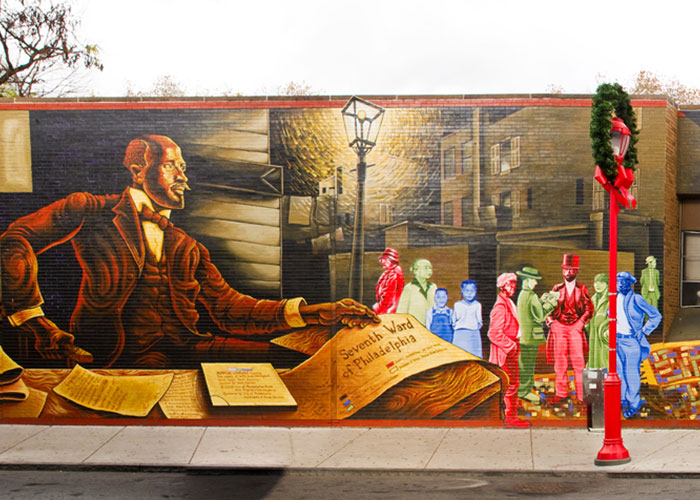Anti-Racism Syllabus Draws on Black History in Philadelphia to Inspire Change
By Tom Durso
 Mapping Courage: Honoring W.E.B. Du Bois & Engine #11,” a mural by Willis Humphrey, Philadelphia. Photo by Eric Anestad.
Mapping Courage: Honoring W.E.B. Du Bois & Engine #11,” a mural by Willis Humphrey, Philadelphia. Photo by Eric Anestad.
September 29, 2020
Like many organizations, Drexel’s Department of Sociology spoke up with passion and eloquence after the death of George Floyd at the hands of the Minneapolis police and the nationwide wave of protests that followed.
Some of the country’s largest protests took place in Philadelphia. Amid intense demonstrations against racism and police brutality, the department supplemented its statement by aggregating and posting a list of print, online and multimedia resources to help people begin to understand and address racial inequality in the city.
“There are a number of excellent syllabi on the prison abolition movement, Black Lives Matter, racial health disparities, and so forth,” says Kelly Underman, PhD, assistant professor of sociology, who initiated the project. “But we wanted to focus on Philadelphia’s own unique and troubled history.”
Sociology faculty members worked to identify key topics and highlight readings, social media posts and videos for each topic. Additionally, followers of Underman’s Twitter feed responded to her post calling for suggestions. The result is the Philadelphia Racial Justice Syllabus.
The intent, says Underman, was to put the protests happening in Philadelphia into their local, historical context. For instance, she cites the city’s 1985 bombing of the MOVE compound in West Philadelphia, which ultimately led to the destruction of more than 60 homes there, as necessary to understanding the implications of the police tear-gassing of 52nd Street during this year’s protests.
“Another example,” Underman continues, “is that, as sociologists, we wanted to center the very important work of one of the founders of our field, W. E. B. DuBois, whose groundbreaking scholarship was conducted here in Philadelphia at the end of the 19th century.”
In addition to MOVE and DuBois, the syllabus covers such topics as policing in Philadelphia, Black activism, environmental racism, former mayor Frank Rizzo and more. The resources cited include books, films, articles and interactive tools – all aimed at using what happened here in the past to understand what’s happening now everywhere.
“Basically,” says Underman, “place and history matter for national movements.”